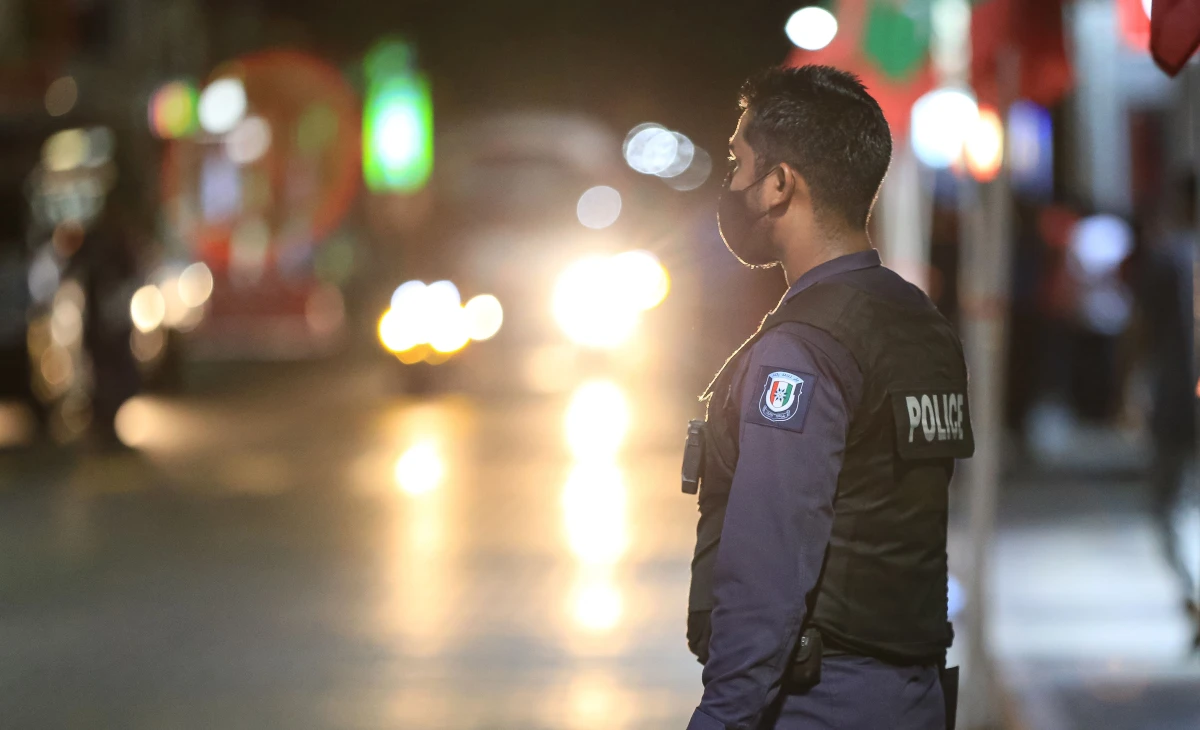Wed, 17 Dec 2025
|DHIVEHI
Government strengthens national security framework with new anti-gang law
12 Sep 2025
|

Photo: Maldives Police Service
The Government of the Maldives has reinforced its campaign against organised crime and strengthened public safety with the enactment of the Prevention of Gang and Other Serious Offences Act.
This legislation reflects the Administration’s commitment to protecting communities, enhancing law enforcement capacity, and upholding the rule of law. It introduces new legal definitions, establishes harsher penalties for gang activity and serious organised crimes, and creates mechanisms to shield children from criminal involvement while monitoring high-risk individuals.
Passed by Parliament on 15 May 2025 and ratified by President Dr Mohamed Muizzu on 25 May 2025, the Act consolidates the Government’s strategic priorities in addressing gang-related violence. It prescribes penalties for organised crime, serious offences, and the acquisition of illicit wealth, while granting law enforcement agencies special powers to confront dangerous activities. The Act also outlines protocols for offender rehabilitation and reintegration, with particular emphasis on safeguarding young people from exposure to criminal environments.
The scope of the legislation is wide ranging. Under Article 3, major organised crimes are defined as drug trafficking, human trafficking, illegal goods trading, currency counterfeiting, and violent offences such as murder, assault, grievous bodily harm, kidnapping, and intimidation, alongside other crimes punishable by more than ten years’ imprisonment.
Severe penalties are introduced, including a 25-year prison sentence and fines ranging from MVR 200,000 to 10 million for establishing or operating a criminal organisation. Attempting, assisting, or participating in such activities carries an 18-year prison term and fines between MVR 100,000 and 5 million. Recruiting minors into criminal groups is punishable by 25 years in prison and fines of up to MVR 10 million.
Minister of Homeland Security and Technology Ali Ihusaan expressed confidence that the Government can significantly curb gang activity. Gang prevention has long been framed as a cornerstone of the Administration’s agenda for law, order, and public security. In this regard, the Act supports national objectives of reducing crime, fostering safer communities, and restoring public confidence.
The Government had already established a specialised Gang Crime Enforcement Unit within the Maldives Police Service on 1 July 2024. Early results have been notable: 31,511 individuals were questioned in identified hotspots, 180 arrests were made, and 83 charges filed. Importantly, no loss of life from gang-related violence was recorded during this period, signalling measurable progress in enforcement.
Despite these advances, significant challenges remain. These include ensuring consistent and fair application of the law, addressing concerns over warrantless arrests, and clarifying broad definitions of “major organised crime” and gang membership. The extension of police powers must also be carefully balanced against constitutional rights, including access to legal counsel and the right to remain silent.
Moreover, the implementation of complex measures such as gang designation, surveillance orders, and asset seizure is expected to place considerable strain on the judiciary and law enforcement agencies. Social dimensions, particularly the treatment of minors, public perception, and the risk of unintentionally criminalising non-criminal behaviour underscore the need for vigilant oversight.
In response, Commissioner of Police Ismail Naveen pledged to prevent misuse of the sweeping powers granted under the Act. In his first media interview with state media, he sought to allay public concerns, affirming that the Maldives Police Service will uphold integrity and accountability in enforcing the law. Naveen stressed that as long as he remains in office, no abuse of power will be tolerated. He further noted that procedures and manuals are being developed to guide implementation, while parallel efforts focus on strengthening police capacity.
While assuring the public of zero tolerance for misuse, Naveen also acknowledged that significant work lies ahead. He highlighted the importance of intelligence-led preparation in anticipating challenges once the Act comes into full effect. Despite these hurdles, the Commissioner expressed confidence that the legislation would become “a force to be reckoned with” in curbing gang violence, while also emphasising the need to adapt to emerging demands and close gaps in enforcement.


Popular News







